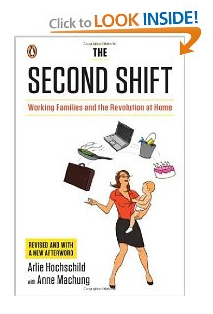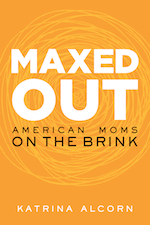 I read The Second Shift more than a decade ago, when I was fresh out of graduate school, working at an Internet startup, newly married (to my first husband), and planning to have a child. That book scared the hell out of me.
I read The Second Shift more than a decade ago, when I was fresh out of graduate school, working at an Internet startup, newly married (to my first husband), and planning to have a child. That book scared the hell out of me.
It was based on research conducted in the 1980s by the prize-winning author and sociologist, Arlie Hochschild, and described the lack of equality between couples in households where both parents worked. The women in the study worked full-time jobs, then came home and made dinner, cleaned the house, bathed the kids, all with very little help from their husbands. Many of them went back to work after the kids went to bed. They were stressed, resentful, burning out.
I vowed never to be trapped like the women in Hochschild’s book, and immediately began to have heated arguments with my husband about sharing the mopping of floors and scrubbing of toilets.
Several years later, I lived my own version of the book. Although I was married to a man (my second husband) who pulled his weight at home and in every way imaginable was an equal and loving partner to me, I found the competing demands of a growing career and a growing family beyond grueling.
Every once in a while, I thought about Hochschild’s book, and felt a ray of gratitude that the author, without knowing it, had validated the struggle I found myself in.
A new version of The Second Shift just came out last month. Imagine my surprise and delight to find out that Hochschild had discovered a story I wrote here and on HuffPost and devoted three paragraphs to recounting it in the new Afterward.
!!!
But that’s not why I think you should read the updated version of the book. The author compares the status of working mothers around the time the book was first published to where we are now. Her conclusions are fascinating, heartbreaking, and important food for thought for any woman (or man) who cares about gender equality.
A few ways things have changed since 1975:
- Far more mothers with children under age 3 work (from one-third to nearly two-thirds)
- Men help more with the “second shift” of household and kid-related chores, but women still put in 5-7 hours more per week
- Men still have more leisure time than their wives
- Women still “feel more rushed” than their husbands
In other words, we’ve made progress since my mom was raising me, but we have a long way to go.
Hochschild says the women’s movement did a bang-up job empowering women to “stand equal to men”. But it failed to value the caring of others.
“Without our noticing, American capitalism over time embraced empowerment and sidetracked care. So in the absence of a countermovement, care has often become a hand-me-down job. Men hand it down to women. High-income women hand it to low-income women. Migrant workers who care for American children and elderly, hand the care of their own children and elderly to paid caregivers as well as grandmothers and aunts back in the Philippines, Sri Lanka, Mexico…[and those] at the end of the care chain pass child-care duties to oldest daughters. The big challenge in the years ahead–the challenge at the heart of this book–is to value and share the duties of caring for loved ones.”
What would it look like to value and share the caring of others?
Today, for most professionals–women and men–a full-time job means more than 40 hours per week. Many low-wage workers have to work more than one job just to get by–and studies show Americans work some of the longest hours in the developed world. You can have a perfectly equal marriage at home, but if you’re both working 40-plus hours, there simply isn’t enough time for the second shift.
How do we get that time back?
Having two working parents does not have to be at odds with our quality of life. Hochschild talks about Norway, which has both the highest rate of working mothers and the highest rate of child well-being. (The U.S. ranks a pitiful 20 out of 21 countries on child well-being, according to a 2007 UNESCO report.)
But Norway has built a society that supports both working moms and dads, with generous paid leave, subsidized childcare, and a 35-hour workweek. Meanwhile, we can’t even agree on whether the richest 1 percent of Americans should be taxed at the rate of Warren Buffet’s secretary, but I digress…
What do you think? How do we get our time back, so we can share that second shift?
* * *
Speaking of how modern day couples and sharing the second shift, have you read about this survey:
Who Clips the Nails?
* * *
I’m posting to this blog a few times per month.
Sign up and never miss a post: Email | RSS | Facebook | Twitter





{ 12 comments… read them below or add one }
Sorry – I wasn’t sure where on your site to post this —-
I am a wife and working mom with 2 boys under 3. I am sooooooo grateful for your blog. I realize that I am not alone in how I feel. Thank you, thank you, thank you. Honestly, you have saved my life.
Right here is a fine place to post that. Thank you, Jamie!
Just hang in there. It will be so much more manageable when your youngest turns 4. Really.
I quit my job and took up freelancing … but that was not so much so that I would have time for the “second shift” as it was so that I could give more to the “third shift” — my writing. My husband is an artist, too, so he also has a “third shift.” Insofar as the second shift goes, we take care of the Critter and get meals on the table, but the apartment is almost always a mess.
I’ve never finished The Second Shift, because I get so depressed reading the first case study. And, actually, though I do sometimes use the shift metaphor myself, I actually have a problem with collapsing one’s entire work life outside of paid work into one “shift.” I noticed this tendency most prominently in Kidding Ourselves, which seems to have been written (in part) as a response to The Second Shift. Yes, I recommend the book, but I found the Rhona Mahony’s use of the word “chores” to discuss the second shift as off-putting. Washing the dishes is a chore — but what about taking care of my baby? It’s work, yes — but a chore?
I agree with Rachael about caring for babies/loved one as a “chore”. It’s not.
And everything is related to about economics so I have to read this book. We will NEVER see an economic model like Finland and Norway in the U.S.
If we made an effort to seek universal “paid/extended sabbaticals” instead of family leaves, etc. we can make head way. We need the co-op business model to gain traction here, too. Women are of backed into an ‘everything equal’ corner so we need to propose equalize marketplace ideas to meet our needs in the U.S. The “welfare state” police are ready to pounce on anything European.
Might I add…I just got a cleaning lady. Every 4 weeks! It really helps me feel less overwhelmed to know those cobwebs will not show up as often!
Once again, thank you. This blog came just in time. The worst part is when I begin resenting my family – all of them, for not carrying more weight, when we are all overwhelmed. Don’t have the energy to negotiate or harass others into taking more on, or feel guilty asking.
Coming late to the party, but I just wanted to say that I hear you Linda – especially the part about feeling too tired to negotiate – harass – beg – plead – threaten…… Good to know I’m not alone. Wishing you peace.
Linda, I’m sorry your family feels that way, the fact you are here and post means YOU CARE! Stand your ground, show your love and make it clear you are all in this TOGETHER!
My mom left my dad over the summer after 45 years of marriage. She always wanted to be a stay at home mom, and as far as I can remember resented working. Had maybe one job since she was 18 she might have sorta enjoyed. She is now living with her high school sweetheart who is a retired lawyer; haven’t spoken to her since she left since she basically dumped us (her husband, 3 kids, grandkids, brother…literally dumped us all) for a new chance to try her life out.
I used to be super close to my mom. She taught me to be confident and independent and caring.
I’m of course angry and sad and know my mom has some mental issues, but I can’t help but learn from all of this too. My parents both worked, and my dad did his part of taking care of the kids, particularly for a dad in the 70’s. Having said that, I know my mom got pressure to have dinner on the table, to manage the checkbooks (NOT her forte) and over the years her social life disintegrated, her marriage (though she would never admit it), etc. etc.
This past year, I’ve thought more about the fragile balance my husband, daughter and I commit to every day to stay happy and healthy. We both work and luckily, we have flexible jobs, a HUGE help in balance. There’s SO MUCH to balance that we often overlook! I guess this is just a long way of saying thanks for the book recommendation, I will read it…but then just continue to find the love and support you all need. We all need. It is a never ending pursuit. : )
Add onto that a second child with special needs, and you realize how many shifts there actually are! And I respectfully disagree – some aspects of child care ARE a chore. It doesn’t feel that way with your first baby, but as the years go by the argument of who stays home with the kids on school holidays and sick days becomes a heated one between couples.
Working parents should ABSOLUTELY get more paid days off than those without kids at home. There needs to be a whole separate category of PTO for that. If I took a sick day or a vacation day every time there was a day off from school or one of my kids was sick, I would be out of PTO by March. One of the many penalties that our society imposes on parents. But if every working mother (and you know it would almost ALL be mothers) stayed home from work, the economy would crash and we’d set our gender equality back by decades, and as usual single mothers would be hit the hardest.
Norway rocks. Thanks for posting this, had no idea the book was re-done. Will run out and get it. Remember reading this in a sociology class in college in horror. Work 60 hours or so with a 7 year old at home and still feel the horror sometimes. There must be a better way.
I’m feeling depressed these days with my own rather rough second shift, so I apologize in advance for the negativity, but …I don’t think we aren’t going to change anything around here like “valuing care”. We aren’t going to become like Norway, either. I think the problem is maybe capitalism and global competition and immigration, all at once. And maybe our own high expectations, too, which will have to be scaled down drastically. And policies that favor corporations and wealthy avoiding taxes, as you pointed out with your Buffett comment.
I don’t know anything about Norway, but my WAG is that it is highly socialized, but it’s an incredibly small and homogenous society (10 million?) that is incredibly rich in resources (read, North Sea oil), and they probably don’t allow immigration except under unique circumstances. Meanwhile, the US is huge, diverse, not as resource rich, suffers from a legacy of slavery and discrimination that still seems to haunt large portions of the African American population, and has a huge immigration issue. We aren’t a small, closed system. We aren’t set up well for socialism. We also have a strongly capitalistic history, which doesn’t help. So comparisons to small Scandinavian countries are probably never appropriate. And plus, do they have a high unemployment rate? Many European countries seem to…
For many Americans, higher salaries could be the answer, but they won’t happen. The reality is that for many American jobs, there is probably someone else who can step in, either in another state or in another country. Competition is everywhere. Do we arbitrarily pay people x, even if there are people just as good willing to do it for 1/4 x??? Not likely. Look what happened with unions and pensions.
And to top it off, life is more expensive. Our expectations are higher. When I was a child, I drank powdered milk and my mom served me campbell’s soup a lot. Today, my DH and I buy organic milk and we are worried about bpa in can linings, not to mention campbell’s is gross. We are more like the Progresso generation now. It’s hard to go backwards and down size. Same with medical care. 40 years ago, you took your lumps if you got sick. In many instances, there wasn’t much that could be done. Today, any person with insurance can have a stem cell transplant…Homes are bigger, too. My grandparents lived in a really small house. Maybe part of that is media…constantly observing the Jones’, and seeing luxury items. I frequently see what I think are blue collar kids with very fancy handbags. The desire for status is insane.
Personally, I’m fairly hopeless. I expect a long, tough grid ahead where I will barely be scratching by each month, and doing a tough second shift, unless something very unexpected happens.
Thank you Nicole for your thoughts. It seems to coincide with mine. This problem is not just for America but many rising developing countries as well. I have two sons (11yr and 1.5 yrs old). The family always supported me on caring but still sometimes I have to deal with feeling of guilt. Like Kristy said, we just have to keep on finding the love and support we need, and feel no guilt. We have to constantly give the message to all: that a healthy and happy family means a healthy workforce (now and future) and that leads to a healthy nation.
I’m grateful for this site. I am a working mom with a young teen, and I’m married to someone with ADHD, so it’s more like having two teens than a teen and a partner. I’ve recently hit the wall and would give a lot to have someone take care of me for a while (I fantasize about lying in a quiet room and having someone care for me until I feel strong again — sort of akin to your hospital fantasy).
Financially, we’d be better off to continue our course (we have no debt outside of a mortgage but not enough savings, and our cars our ancient and our house needs lots of work), but since I don’t think anyone is ever going to take care of me, I’ve started thinking about what I can pay for, ranging from the practical (paying for help cleaning) to the sublime (a massage) to get some help and feeling of being cared for. I wish, though, there were a way to do this without paying — especially because so many women can’t afford that at all. Not long ago, I was in that position, as my husband was unemployed for several months.